#Bavitz
Text
Art of the two main characters of my upcoming Pokemon fanfic, When I Win the World Ends. (Artist: 7th)


176 notes
·
View notes
Text
hello
do you trust me to recommend you some books
I read ~170 this year and here’s reviews of my top ten, written for fb and crossposted under the cut in case you’re interested
1: Camp Concentration by Thomas Disch
-I know it’s not obvious from the way I conduct myself here, but I have a very large vocabulary. I was a kid who read the dictionary and also any thesaurus I had access to. So, that said, consider how much it means to me personally that this book taught me 30-50 new words. This isn’t a huge part of the reason I loved this book, but it is a very impressive fact about it that I think will grab the attention of people who might otherwise not read it. This book changed the way I read, the way I think about literature, and the way I evaluate what I have previously read. It’s offensive to me that I lived 30 years as an avid reader and culture sponge without hearing about this book. I cannot recommend it enough. I give it top spot on this list for a very good reason. I’d like to avoid spoiling any of the plot because while I called the twist easily, discovery of each point was so delightful that I want you to have that same experience.
2: Cockatiel x Chameleon by Bavitz
-You all have plenty of experience with me recommending works of fiction published online in formats that deter most readers. This is a normal Najwa activity. I know how it sounds and I know, therefore, that this plea will go more or less unheard, but I BEG you. Look past the fact this was published on AO3. This is one of the most remarkable books I’ve read, period. I mentioned in my worst of how much it bothers me that most writers can’t plausibly write about the internet. This book is the FUCKING ZENITH of writing about being online. It is the absolute peak and I will be shocked if I ever encounter another work that overtakes it. This is a book about people who are so strange they are barely human, but in ways that will be instantly familiar, intimately true, to those of us who grew up on the internet. There is violence and abuse and love and beauty and Chatroulette. There is art and gore and exploration of identity and apocalypse. There is fucking POSTING.
3: Serious Weakness by Porpentine
-Charity Heartscape Porpentine is one of our greatest living authors, opinions of snide Twitter users notwithstanding. I am an evangelist for her Twine game poetry because it is so singular and so affecting. Even a decade on, I can play through Their Angelical Understanding and feel freshly stabbed in the gut. Imagine the thrill I felt when she posted about her completed novel. I would (strongly) recommend this even to people who (somehow) bounced off her games, because her prose style is very distinct from the voice those are in (yet still recognizable). This is an incredibly violent, sick, stomach-turning, difficult, ugly, terrifying book. It’s also ultimately asking the reader a question about love and compassion. If you are sensitive to any trigger in written word about any violent action one person can do to another, skip this book, but if you feel like you have the strength, give her the nine bucks or whatever that she’s asking and devour it like I did. A hook for you: our protagonist has a chance meeting with an embodiment of pain. What follows includes torture, gender, climate disaster, and Columbine. Gorgeous. This book almost convinced me to start doing video essays so I could explain to people the incredible factors at play in it.
4: Negative Space by BR Yeager
-I have been trying to read this book for free for so long that I broke my streak and paid actual money for it. It was one of the better purchases I made all year. Thanks to finally reading some Stephen King this year I now have the requisite foundation to see how heavily his style inspired Yeager in this book, but I would die on the hill defending my position that Yeager does King better than King ever did. There is evil seeping out between the lines of this book. Have you ever had a nightmare that made you feel doomed the entire next day? Have you ever felt you were trapped in your shitty, dying home town? Have you ever been seduced by the excitement of activities that you know might actually kill you? Have you ever woken up in the middle of the night and looked at your own dark reflection? Go back to the deepest point of your teenage depression here.
5: We Who Are About to by Joanna Russ
-One of the shortest entries on this list and so one of the easiest sells, but it is just as full of meaning as any other that made the cut. There is so much implied and unsaid about this protagonist. She feels whole, like this is the last chunk of chapters in a series centered on her, but she represents something universal. She is one member of a group from a crash-landed spaceship, a group small enough in numbers that there’s no way for humanity to last on this planet more than one more generation. Any attempts to do even that are so plainly cruel and self-deluding that she wants no part of them, but the others with her don’t see it the same way. Her story is womanhood under patriarchy, it is life and death, it is self-determination. Brutal. I read this at the airport and cried in public.
6: Carrie by Stephen King
-As much as I hate to say it, I gotta hand it to Uncle Steve (or really to Tabitha). This book very nearly justifies the rest of his career on its own. I thought had picked up most of it from cultural osmosis, but there was a truly shocking depth that I couldn’t have found without experiencing it firsthand. Maybe it’s funny to use this word here, but this book is humanist and compassionate and sincere in a way that King never finds again, particularly with the women he writes. Carrie is so vivid that I felt a protective instinct for her throughout the book even though I knew she was about to discover her own power. She reflects parts of me about as well as Lindqvist did in Little Star, which is the work of art that is THE most personal to me. A classic for a fucking reason.
7: The Doloriad by Missouri Williams
-This year, lots of the books that I read had strange echoes of each other. In this, I can pick out shades of Carrie, of Camp Concentration, of We Who Are About To, and even of Serious Weakness. Rarely if ever are these references by each author, but it has enriched my experience by having unofficial interlocking intertexts for all of them. This book has been very divisive with reviewers, and I understand why, because it is cruel and the prose is extremely stylistic. This is somewhat experimental and fully literary and sincerely philosophical. I get it. Not for everyone. But it was for me. A clan of inbreds at the end of the world with their eyes on their scapegoat, nonverbal and disabled Dolores. It shocked me and it challenged me and I loved it.
8: The Ice Cream Man and Other Stories by Sam Pink
-These short stories did the exact opposite of the thing that pissed me off about The Florida Project. These are about people who are varying degrees of sympathetic but the same degree of desperately, penny-scrapingly working poor. The easy pull quote is “unflinching,” because it turns an eye on very ugly parts of real life for so many of us. I think people who grew up middle class will find some voyeuristic, prurient pleasure in these stories, but they’re not written for you. They’re written for us, the people who have lived this way.
I Who Have Never Known Men by Jacqueline Harpman 9
-I don’t need to tell you how great this book is, because the whole of booktok has told you this all year. Instead, what I will say is that it is much stranger and less tidy than you’re imagining when you hear the blurb. It’s a short read and it is one of the few times I haven’t regretted following booktok’s advice.
Only Lovers Left Alive by Dave Wallis 10
-This barely squeaked onto this year’s best of, because I started it before 2022 ended and finished it early in the new year. As I read it, especially in the first 20% of the book, I was confused as to how it ended up on my TBR. But toward the end, and throughout the year as I’ve continued to think about it, I understand more instinctively than intellectually that this is a remarkable work. A short synopsis: in the 80s in the UK, there is an epidemic of suicide, but only by adults. The teens left behind forge their own path.
#Porpentine#Bavitz#Thomas Disch#Dave Wallis#Sam pink#Stephen King#jacqueline harpman#Joanna Russ#Missouri Williams#br yeager#b. r. yeager#charity heartscape porpentine
10 notes
·
View notes
Text

so i’ve been reading homestuck fanfiction
(i have not read homestuck)
18 notes
·
View notes
Text
"Life's not a bitch, life is a beautiful woman,
You only call her a bitch 'cause she won't let you get that pussy.
Maybe she didn't feel y'all shared any similar interests,
Or maybe you're just an asshole who couldn't sweet talk the princess."
-Aesop Rock
2 notes
·
View notes
Text
Ok, listen..
It's immature to have crushes on celebri-

4 notes
·
View notes
Note
Kind of a dumb question but does Modern Cannibals have much actual cannibalism in it?
pretty sure it has absolutely 0 actual cannibalism in it. it's a metaphor innit
10 notes
·
View notes
Text
Aesop Rock, Integrated Tech Solutions
New music Wednesday
The ninth album from the New York rapper highlights a shift in his approach from energetic performances on the microphone to more expressive, inventive, and abstract styles. Supported by some of his finest production to date, the album continues to draw attention primarily for his captivating wordplay. His skill in maintaining the listener's interest remains evident, especially as he explores diverse lyrical and conceptual paths. It contains collaborations with Billy Woods, Hanni El Khatib, Rob Sonic, Nikki Jean, and Lealani Teano.
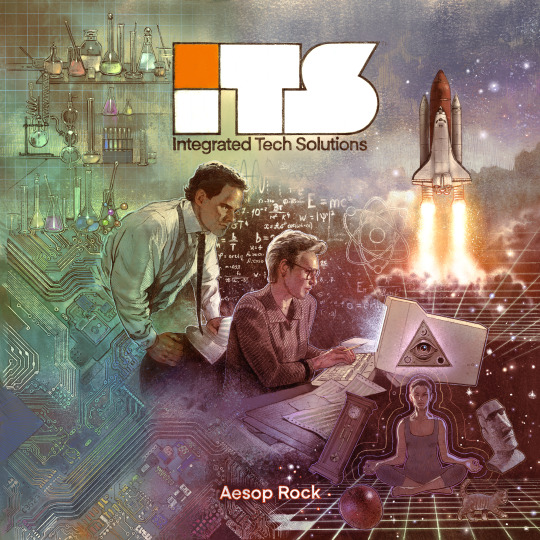
#new music wednesday#new music#my music#great album#musiclover#music#art music#aesop rock#integrated tech solutions#billy woods#hanni el khatib#rob sonic#nikki jean#lealani#hip hop#rhymesayers#new york#ian bavitz#Spotify
6 notes
·
View notes
Text
@aesoprocklyrics
ReinBork — Today at 9:50 AMomg okokok so hang on with me through this thought. You remember the old school Korn art style for the music videos (Right now)? Like the eerie cartoons they would use? Or like Gorillaz music videos (Saturnz Barz) I can totally picture a music video with the song you just sent and like a full adventure those two are having snowboarding through the woods and coming upon a monster or something they fight
Alifyre — Today at 9:50 AMyes I actually
[9:50 AM]AIM TO DO THAT
[9:50 AM]WITH THIS MAN
[9:50 AM]THE ARTIST HE IS MY
[9:50 AM]IDOL
[9:50 AM]ahahahahah
[9:50 AM]I want to animate this whole albu, for him
Ian should hire me to animate the rest of garbology I already srtarted.
0 notes
Text
it is truly impossible for me to describe how good this pokemon tournament fanfic is shaping up to be but I need everybody to read it anyway. Go search When I Win The World Ends by Bavitz on ao3 and get your daily required dose of toxic yuri toxic moms toxic momyuri and esports nonsense today. do Not stop do not pass go do not collect $200
79 notes
·
View notes
Text
oof idk if I care enough about Pokemon to properly appreciate new Bavitz. hopefully the girls with problems will sustain my interest
#when i win the world ends#the writing is indeed high quality as expected and as promised by the tags
13 notes
·
View notes
Text
When I Win the World Ends
The sixth novel by Bavitz is here. When I Win the World Ends, a Pokémon fan fiction featuring a tournament arc, Smogon-style battles, and original and canon characters.
Currently, you can read the first two chapters on the following sites:
AO3
Fanfiction.net
(I am also posting on RoyalRoad, Spacebattles, and Sufficient Velocity, but those sites have a waiting period where stories must be approved. I'll update when they become available.)
New chapters will be posted on Mondays and Fridays.
Thank you, everyone, for supporting me. I hope you enjoy this story as you have my others. If you do, please leave a comment. If you have any questions, feel free to ask me!
71 notes
·
View notes
Text

straight into my guts
5 notes
·
View notes
Text
A teaser to convince you to read Modern Cannibals by Bavitz
A short excerpt below:
"I don't understand."
"Alright, Z." Max sat up again, his face grinned like Maximillion's. "I'll explain everything once, and only once. If you don't understand then, you'll never understand."
Z. tensed, this seemed important, she wondered if she should take notes, she had no paper. He spoke:
"Imagine the dream in Blade Runner. The dream of the unicorn. The entire movie, Deckard—and the audience—believe they know everything. The replicants are loose and Deckard is an inspector who has to decommission them. The world follows a singular track of truth. That world is our world, before Hussie. The modernists, the post-modernists think they know the world—even if what they think they know is that the world is unknowable. Those arrogant authors believed because they could not know the world, the world could not be known. Do you understand? Do you follow?" He spread his hands wide, as though measuring something. "But Hussie—Hussie folds an origami unicorn at the end of the movie. He places it on the ground. He knows the dreams of the other authors. He knows their arrogance is folly, because he has formulated a better truth. The other authors were creations of man. Hussie is a man himself."
"I dreamed about the unicorn," said Z. "Last night."
"You, too, are a replicant," said Max. "We all are. We are automatons who believe we know ourselves. Hussie holds the only true knowledge. We shall expire."
"It's just for fun, right Max? Just entertainment, right? Or art, or whatever you call it."
"So you don't understand."
She knelt beside his bed. "I understand that feeling, Max. That feeling when you're reading or watching or playing something so good it seems like it's the only thing in the whole world that matters, in fact it has its own world, and that world seems so much cooler and better than your world, so you stay there and not here. And you do it for a day, a week, a month. But always that world—there's limits to that world, okay? It always ends. Because if it got made in this world, how can it be bigger than this world?" She had lost her point somewhere. She stopped talking.
"It's bigger," said Max. "That's my entire point."
#fic rec#i have seen few works of fiction that engage with metafiction like this one does#I keep returning to it
11 notes
·
View notes
Text

Irony vs Sincerity in Fight Club
Born too late to fight in the Vietnam War. Born too early to grow up after 9/11. This film is basically just about that guy.
Fight Club, alongside similarly green-tinted 1999 icon The Matrix and American Beauty, is identified by Bavitz as a "cubicle movie"—much like his novel Cockatiel x Chameleon—which depicts a world at the "end of history" where man is left purposeless. To these titles I'd add 1993's Falling Down, American Psycho, and maybe Being John Malkovic; to my understanding, these all seem to be operating in a similar space to varying degrees of success. Of these, The Matrix strikes me as being the most timeless, as its metaphysical themes and sci-fi concepts help unground it from this specific point in history.
Throw yourself through the glass table of that "Keep reading" button below to see what I thought of the film!
The biggest surprise of Fight Club for me was the sheer extent of its stylisation. It's full of heavily metatextual beats, counterfactual imaginary sequences, cutaways, dry novelesque narration (not too surprising for an adaptation of a story like this), and a borderline magical-realist tone. Stylistically, it feels much more modern than it actually is, and I can only assume (as someone who's seen comparatively little pre-2000s media) that this is because of the influence this has had on a lot of newer stuff. I'm now much better able to understand why people rolled their eyes at the general reception to Joker, which is kind of just the same thing but worse. I'm also floored by the extent of the plagiarism committed by the much-lauded Mr. Robot; it was while reading about that show (having given up on actually watching the damn thing) that I unfortunately completely spoiled myself on the big twist in Fight Club.
(Spoilers follow.)
So knowing in advance that the twist in Fight Club was that [secondary character] and [main character] are actually the same person, I was primed to look out for anyone who appeared to be an imaginary friend. And towards the start of the film, I found my figment not in Tyler, but in Marla. Explicitly framed as a female counterpart to our everyman protagonist, Marla is introduced in the implausible context of her dishonestly attending a support group for men who've lost their testicles. The only possible explanation I could think as to why nobody seemed to bat an eyelid at this was simply that Marla wasn't real. She also spends a lot of time standing around in traffic; at one point, a bus appears to go right through her.
But then of course, we're introduced to Tyler, and the narration introduces him using phrasing that deliberately echoes the introduction of Marla. Able to instantly recognise Tyler's bright red jacket from the spliced-in frames of him that would occasionally flicker onscreen before this point, I understood that no, Tyler was definitely the imaginary friend I'd read about. But still the idea lingered: that it was not just Tyler who doesn't exist, but Marla too; where Tyler personifies the masculine ideal, Marla is the embodiment of the feminization believed to have driven the protagonist towards stagnant impotency and dissatisfaction. Tyler and Marla rarely appear in the same scene, and often the direction deliberately creates the impression of one being transmuted into the other; as one leaves the stage, the other enters.
This interpretation has the fun effect of turning the everyman into an incel, rather than the sex god Marla at one point begrudgingly admits him to be. Of course he finds Marla easy to please; these scenes are just an abstraction of him jacking off. This lens is an invention entirely for my own amusement, however. The simplest explanation for Marla's portrayal is that the film is not that there's a second layer of twist bullshit which goes unremarked upon, but rather that the film is carefully establishing a language of hyperstylisation from the outset, so that by the time of Tyler's appearance, the implausible aspects of his character feel like just another part of the film's worldview, rather than signs of foul play. The incel hadn't even been invented back in 1999. I'm compelled by the idea only because of a cultural shift which had yet to occur. Even if it feels like a natural fit for the themes otherwise being explored by the movie, it's not something the filmmakers consciously incorporated into the narrative.
Truth be told, there are many aspects of this film's messaging which feel dated, or at the very least ideologically incomplete. Most obviously, it simply would not have depicted terrorism the same way if it had been written after 9/11. There's a whole idea surrounding this film in the modern zeitgeist that most people misinterpret it, vacillating between viewing it as a fuck-yeah story about some badass redpilled chad, and as a merciless deconstruction of that same archetype. I think this is because the film itself is suffused with irony, making it hard to necessarily extract the intended message; I imagine the filmmakers don't want you coming away from it believing you understand any particular moral of the story.
Nonetheless, I think the film does take a pretty clearly consistent view of humanity, and it is a fairly bleak one. It's strongly critical of consumerism, and it has very strong ideas about masculinity. By the end of the film, we've plunged into this farcical world where every man is a die-hard member of Project Mayhem (there is only one woman in the film, Marla), and I think the film means to suggest that this is the "true" form of man, the "hunter" of "hunter-gatherer society", unbound by fictional constructs such as law or gender. There is a natural hierarchy, and it is one of strength. Most people are happy to believe anything you tell them, even if you don't believe it yourself. Tyler is never really framed as having indoctrinated these people, but rather as having awoken something in then, having preyed upon their true desires. Although Tyler is viewed as monster, he is also presented as broadly achieving noble outcomes through his monstrous actions: it suggests that the clerk he threatens to shoot really will have his life positively changed by the experience, that Bob really was happier at the Fight Club than he ever was at the support group, and that the destruction of the credit card companies' headquarters might really result in some kind of lasting socioeconomic change for the better.
The problem the film identifies with Tyler is less in his beliefs about the prison of American society, and more in his extremism: there is no line he will not cross, nothing he holds sacred. His terrorist acts are framed as the logical endpoint of the childish pranks we see him committing during his introduction, both aiming to transgress the fragile social contract. He wants to burn everything down (good) but has nothing to replace it with (bad); he believes that a face beaten to an unrecognisable bloody pulp is, on some level, the most honest a face can be. If I personally had to identify a thematic throughline in Fight Club, it would probably be this conflict between sincerity (embodied by the everyman, who spends much of the film simply trying to feel a real feeling, and grows increasingly alarmed by Tyler) and irony (embodied by Tyler, who behaves in unpredictable ways just to provoke a response, and is actually an "insincere" element of the everyman's psyche). At the start of the film, our narrator craves the emotional openness of the support groups, because he himself struggles to muster the appropriate emotional response to a burnt-out car wreck full of human body parts. It's only after the death of Bob that he finally feels true grief and outrage. Towards the end of the film, he finds it impossible to communicate with any of the members of Project Mayhem, as his every question is met with answers like "is this a test?" or the parroted phrase "the first rule of-"; they've been primed to give these responses by the fact that it is impossible to have a straightforward conversation with Tyler about anything. The final scene of the film concerns itself with the reconciliation of these viewpoints, as the everyman finally takes personal responsibility for all the actions undertaken by Tyler, and finally appears to "kill" this split persona entirely. To borrow a phrase from the Worm fandom, he seems to do "brain surgery with a bullet", somehow shooting his head at exactly the right angle to destroy the portion of his brain responsible for this delusion, while leaving the rest intact. In practise, it's more that the physical act of shooting himself finally grounds his perspective, as he understands that it was him who wielded the gun, him who pulled the trigger, not this other guy he made up.
The film's final image is of the everyman and Marla backdropped by the spectacle of all these skyscrapers collapsing; visually symbolising the slate being wiped clean, the debts erased. To me, this can only suggest that he and Marla will have a fresh start, and that some form of long-term relationship is finally possible between them. If so, this fairytale ending is pretty rubbish; but perhaps this isn't the film's intention, and I was just missing something.
Regardless of your beliefs on the ideas which Fight Club appears to denigrate or endorse, it's hard to deny that on a technical level, it's a well-crafted masterpiece with a fairly complex story that's unpredictable and entertaining. It's constantly escalating. It's got a fun twist. It's just that the more you talk about it, the more you find yourself talking in circles, struggling to settle on the perfect lens which captures the film in its entirety. So don't talk about Fight Club—just enjoy it.
Rating: 9/10
If you’ve enjoyed this review, you can find dozens of similar essays over on my Letterboxd account.
2 notes
·
View notes
Note
Thank you for making that one ask about Madoka and Homura, it felt very cathartic. Bavitz' take on the Madoka Magica always came across as somewhat bad faith in regards to Homura, so it's nice to see someone else agrees on this.
And while I'm at it, would you consider it disingenuous to describe the Madoka Magica cast as being selfish? Like, I suppose they are, but that also feels like a gross oversimplification.
(Context) (Context for context)
I'm glad you got catharsis out it, I suppose? Although I don't think I actually agree with your feelings as stated; his opinions on Homura don't come across as particularly bad-faith-ish to me, just as emphasizing different bits of her character and her narrative role (and in particular extrapolating her flaws in a different direction) than most of the more-popular interpretations (and my own) do.
As for the followup question: I am probably the wrong person to ask that; I get as far as "well, they do some selfish things and some unselfish things", and then at that point lose momentum and fail to figure out whether they do or don't count as selfish-on-net given that. First because what makes an action count as 'selfish' is ill-defined (is it selfish, or selfless, for Homura to prioritize Madoka's well-being over both her own and that of everyone else around them?), and second because a given action can have multiple motivations (Sayaka healing Kyousuke is motivated both by desire-for-him-to-be-able-to-play-for-people-again and by desire-for-him-to-like-her), and third because there's no obvious well-defined cutoff-point for what rate of selfish actions relative to unselfish ones makes a person count as selfish or unselfish.
If I were to ignore all of that and place the main characters in a continuum from most to least selfish based on pure fuzzy vibes, my first pass at it probably look something like "pre-character-development Kyouko > Homura > post-character-development Kyouko > Sayaka > Mami > Madoka"; but there's some argument for switching Mami and Madoka (Mami seems not to actually hugely like her magical-girling, unlike Madoka who seems to find it very personally rewarding, but does it (in extra-strenuous heroism-optimized familiar-killing fashion) nonetheless), and Homura could be argued to fit practically anywhere on the continuum, and this list doesn't include Kyubey and his motivations are sufficiently up-to-interpretation that he could be argued to fit practically anywhere on the continuum, and overall I feel no particular sense of conviction around the correctness of the list's ordering. Because selfishness is just sort of fundamentally a squishy and imprecise category.
(For certain more-rigorously-defined selfishness-related categories, I could speak more confidently. Kyouko is the most philosophically in favor of people being concerned only for themselves, at least until right near the end of her character arc; Mami is the most self-sacrificing in the name of helping strangers; et cetera. But none of that actually answers the question as asked.)
11 notes
·
View notes
Text
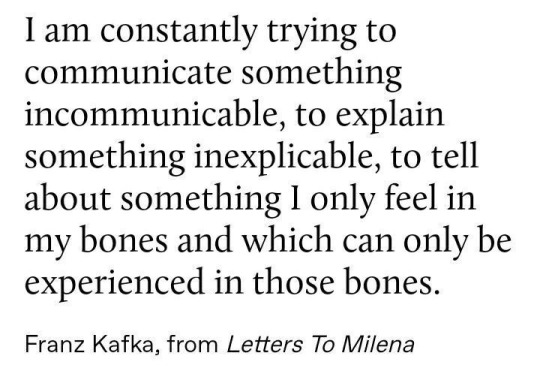
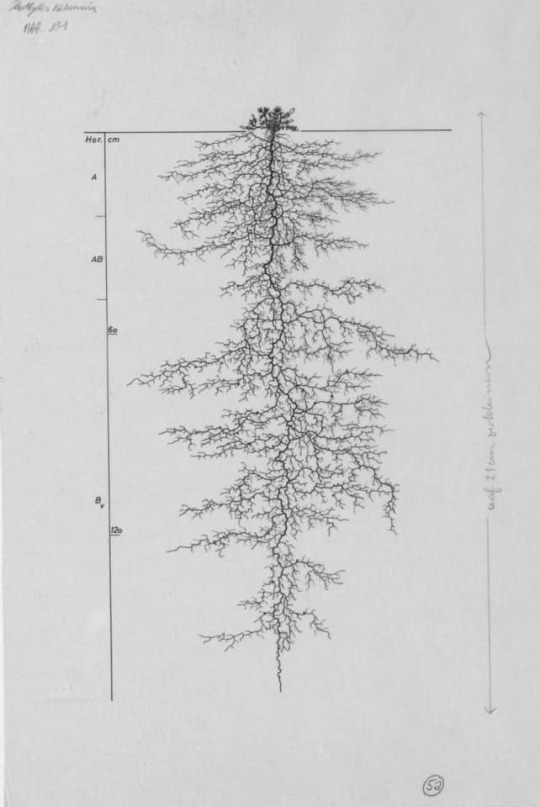


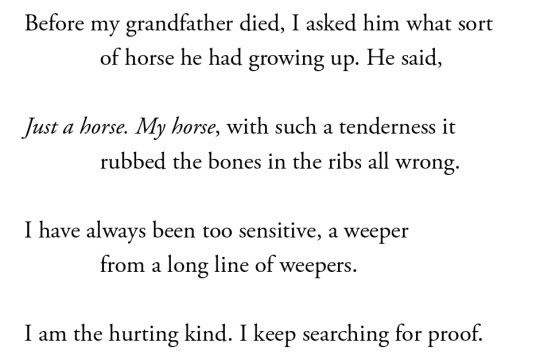

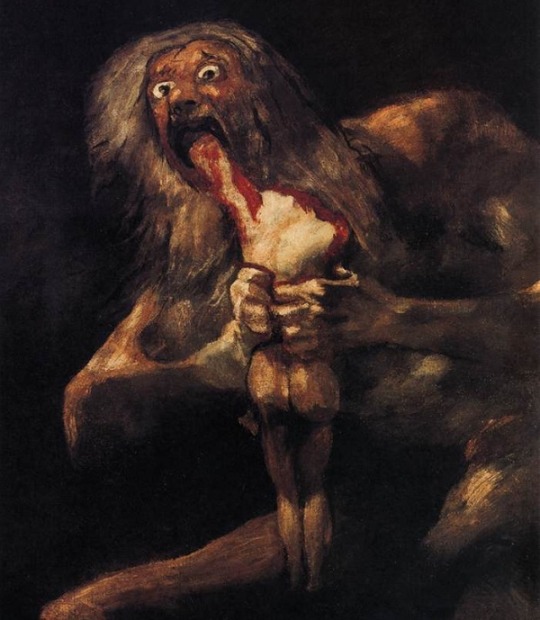












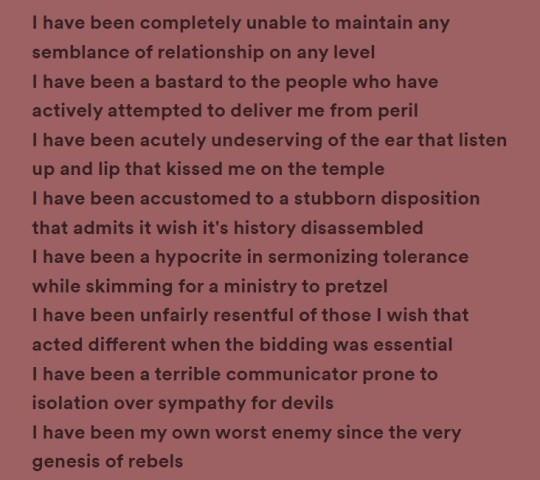
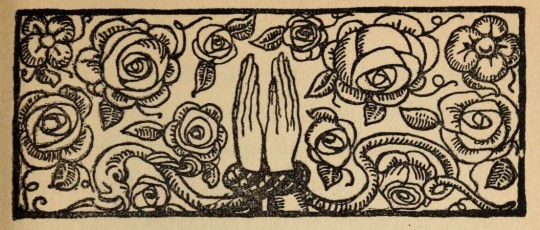





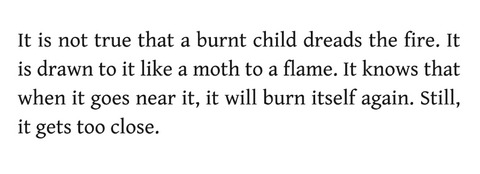

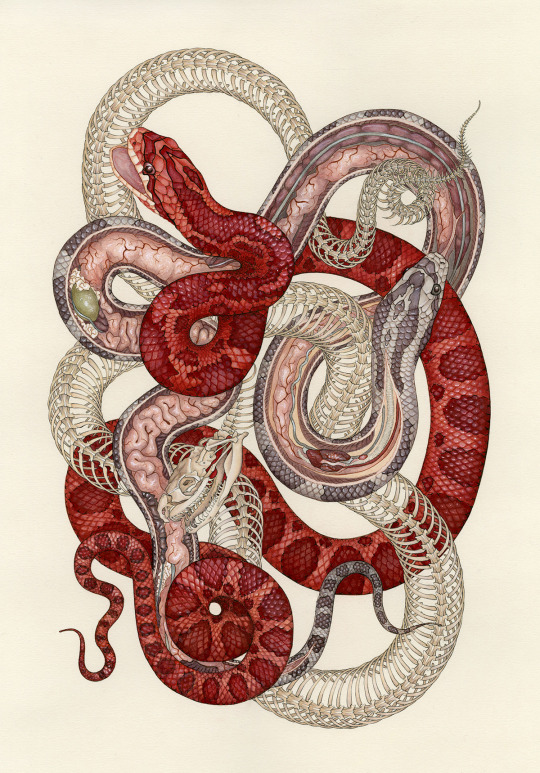




-Ophidian
Franz Kafka // Wageningen University // David Foster Wallace // @saint-ambrosef // Ada Limón // Ben Capalan // Francisco Goya // Catherine Gildiner // Margaret Atwood // Laozi // Architecture mysticism and myth. 1892 // Adonis // Akwaeke Emezi // Anne Carson // Maya Marshall // David Cronenberg // Inio Asano // Maggie Stiefvater // Mark Z. Danielewski // Ian Matthias Bavitz // La Lampara Maravillosa // Brenna Twoh // George Abraham // Emily Dickinson // Heather Havrilesky // Gwen Benaway // Stig Dagerman // Yves Olade // Katy Wiedemann // Ajahn Chah // Katherine Mansfield // Sara Teasdale // The Judge, 1921
46 notes
·
View notes